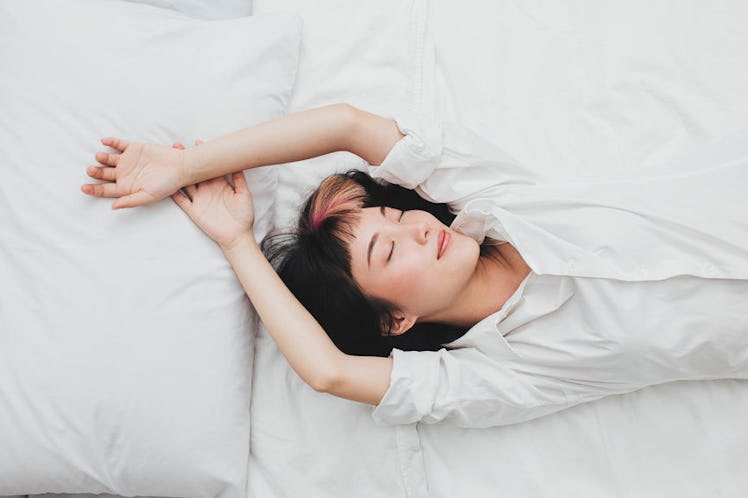
Here's How White Noise Machines Really Affect Your Sleep, According To Experts
Noise can be one of the biggest culprits behind a sleepless night — which means silence must be the remedy, right? Trust me, I recently started to sleep with ear plugs, and it's been a game-changer. I had no idea just how much the noise of my air conditioner and the street below were affecting my ability to snooze. But another way many people often block out, say, a roommate playing music at all hours of the GD night, is by using a white noise machine. But is it safe to sleep with a noise machine, something that simulates the sound of rain, or static, or even a heartbeat, all night long? Or is that, too, creating a kind of noise pollution that ultimately impacts your quality of rest?
First of all, it's important to understand how exactly your brain responds to and processes sounds, particularly when you're fast asleep and not even consciously aware of them. And yes, according to The National Sleep Foundation, while you sleep, your brain does just keep on registering the sounds around you:
Noise can jostle your slumber—causing you to wake, move, shift between stages of sleep, or experience a change in heart rate and blood pressure—so briefly that you don't remember the next morning.
The question of whether ambient sounds actually disturb your sleep, the National Sleep Foundation notes, depends on factors like the stage of sleep you're in, the time of night, and even your emotional connection to the sounds themselves.
But apparently, environmental noise really can disturb your sleep. And while everyone has a different level of tolerance for this, as Popular Science explains, it's not necessarily the noise itself that wakes you up, but the sudden change in your overall environment. And in fact, this is the theory behind why white noise machines can be so helpful. According to the outlet, the ambient noise creates "a masking effect, blocking out those sudden changes that frustrate light sleepers, or people trying to fall asleep." Clete Kushida, director of the Stanford Center for Human Sleep Research, told Popular Science,
This is why the majority of bed partners prefer the constant white noise of a CPAP machine rather than their spouse’s crescendo-decrescendo snoring sounds.
In other words, white noise really isn't bad for your sleep, because the thing is, your ears will pick up on any noise in your bedroom throughout the night. So when given the choice between a constant, neutral whirring sort of noise and the honks of cars outside your window, it's easy to see which one's the better choice, right?
But, according to Martin Reed, founder of Insomnia Coach, there's a simple, yet important caveat to remember if you're planning on using a noise machine in your bedroom: keep it consistent.
"It’s important to bear in mind that sound machines should emit sound as a constant volume and ideally have little audio variation," he tells Elite Daily over email. "For this reason, nature sounds are not always helpful. A white noise machine (or tuning the radio to static or running a fan) is helpful because it masks environmental noise with a constant sound that is not distracting."
Interestingly, Reed also mentions that something called pink noise may be more effective than white noise. "Pink noise emphasizes lower frequencies and occurs more frequently in nature," he says. "Whereas white noise sounds like radio static, pink noise sounds more like rushing water. So, pink noise is thought to sound more ‘natural’ than white noise." And there's even science to back this up: A study published in the journal Frontiers in Human Neuroscience found that pink noise can not only help you sleep, but may also improve your memory, too.
So if you're thinking about trying a noise machine out for yourself, there are plenty to choose from online, many of which you can find at a pretty affordable price. But really, a quality night of sleep is priceless, isn't it?